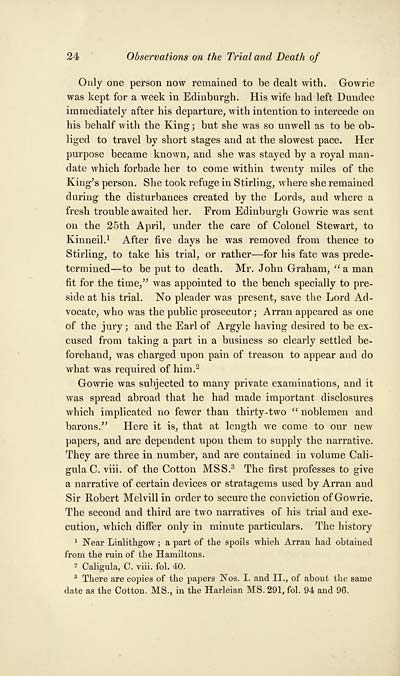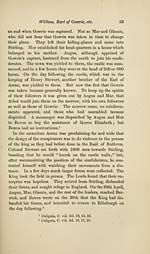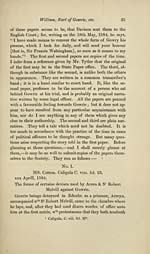Papers relating to William, first Earl of Gowrie, and Patrick Ruthven, his fifth and last surviving son
(40) Page 24
Download files
Complete book:
Individual page:
Thumbnail gallery: Grid view | List view

24 Observations on the Trial anal Death of
Only one person now remained to be dealt with. Gowrie
was kept for a week in Edinburgh. His wife had left Dundee
immediately after his departure, with intention to intercede on
his behalf with the King ; but she was so unwell as to be ob-
liged to travel by short stages and at the slowest pace. Her
purpose became known, and she was stayed by a royal man-
date which forbade her to come within twenty miles of the
King's person. She took refuge in Stirling, where she remained
during the disturbances created by the Lords, and where a
fresh trouble awaited her. From Edinburgh Gowrie was sent
on the 25th April, under the care of Colonel Stewart, to
Kinneil. 1 After five days he was removed from thence to
Stirling, to take his trial, or rather — for his fate was prede-
termined — to be put to death. Mr. John Graham, " a man
fit for the time," was appointed to the bench specially to pre-
side at his trial. No pleader was present, save the Lord Ad-
vocate, who was the public prosecutor ; Arran appeared as one
of the jury; and the Earl of Argyle having desired to be ex-
cused from taking a part in a business so clearly settled be-
forehand, was charged upon pain of treason to appear and do
what was required of him. 2
Gowrie was subjected to many private examinations, and it
was spread abroad that he had made important disclosures
which implicated no fewer than thirty-two " noblemen and
barons." Here it is, that at length we come to our new
papers, and are dependent upon them to supply the narrative.
They are three in number, and are contained in volume Cali-
gula C. viii. of the Cotton MSS. 3 The first professes to give
a narrative of certain devices or stratagems used by Arran and
Sir Robert Melvillin order to secure the conviction of Gowrie.
The second and third are two narratives of his trial and exe-
cution, which differ only in minute particulars. The history
1 Near Linlithgow ; a part of the spoils which Arran had obtained
from the ruin of the Hamiltons.
2 Caligula, C. viii. fol. 40.
3 There are copies of the papers Nos. I. and II., of about the same
date as the Cotton. MS., in the Harleian MS. 291, fol. 94 and 96.
Only one person now remained to be dealt with. Gowrie
was kept for a week in Edinburgh. His wife had left Dundee
immediately after his departure, with intention to intercede on
his behalf with the King ; but she was so unwell as to be ob-
liged to travel by short stages and at the slowest pace. Her
purpose became known, and she was stayed by a royal man-
date which forbade her to come within twenty miles of the
King's person. She took refuge in Stirling, where she remained
during the disturbances created by the Lords, and where a
fresh trouble awaited her. From Edinburgh Gowrie was sent
on the 25th April, under the care of Colonel Stewart, to
Kinneil. 1 After five days he was removed from thence to
Stirling, to take his trial, or rather — for his fate was prede-
termined — to be put to death. Mr. John Graham, " a man
fit for the time," was appointed to the bench specially to pre-
side at his trial. No pleader was present, save the Lord Ad-
vocate, who was the public prosecutor ; Arran appeared as one
of the jury; and the Earl of Argyle having desired to be ex-
cused from taking a part in a business so clearly settled be-
forehand, was charged upon pain of treason to appear and do
what was required of him. 2
Gowrie was subjected to many private examinations, and it
was spread abroad that he had made important disclosures
which implicated no fewer than thirty-two " noblemen and
barons." Here it is, that at length we come to our new
papers, and are dependent upon them to supply the narrative.
They are three in number, and are contained in volume Cali-
gula C. viii. of the Cotton MSS. 3 The first professes to give
a narrative of certain devices or stratagems used by Arran and
Sir Robert Melvillin order to secure the conviction of Gowrie.
The second and third are two narratives of his trial and exe-
cution, which differ only in minute particulars. The history
1 Near Linlithgow ; a part of the spoils which Arran had obtained
from the ruin of the Hamiltons.
2 Caligula, C. viii. fol. 40.
3 There are copies of the papers Nos. I. and II., of about the same
date as the Cotton. MS., in the Harleian MS. 291, fol. 94 and 96.
Set display mode to:
![]() Universal Viewer |
Universal Viewer | ![]() Mirador |
Large image | Transcription
Mirador |
Large image | Transcription
Images and transcriptions on this page, including medium image downloads, may be used under the Creative Commons Attribution 4.0 International Licence unless otherwise stated. ![]()
| Histories of Scottish families > Papers relating to William, first Earl of Gowrie, and Patrick Ruthven, his fifth and last surviving son > (40) Page 24 |
|---|
| Permanent URL | https://digital.nls.uk/94862198 |
|---|
| Description | A selection of almost 400 printed items relating to the history of Scottish families, mostly dating from the 19th and early 20th centuries. Includes memoirs, genealogies and clan histories, with a few produced by emigrant families. The earliest family history goes back to AD 916. |
|---|

